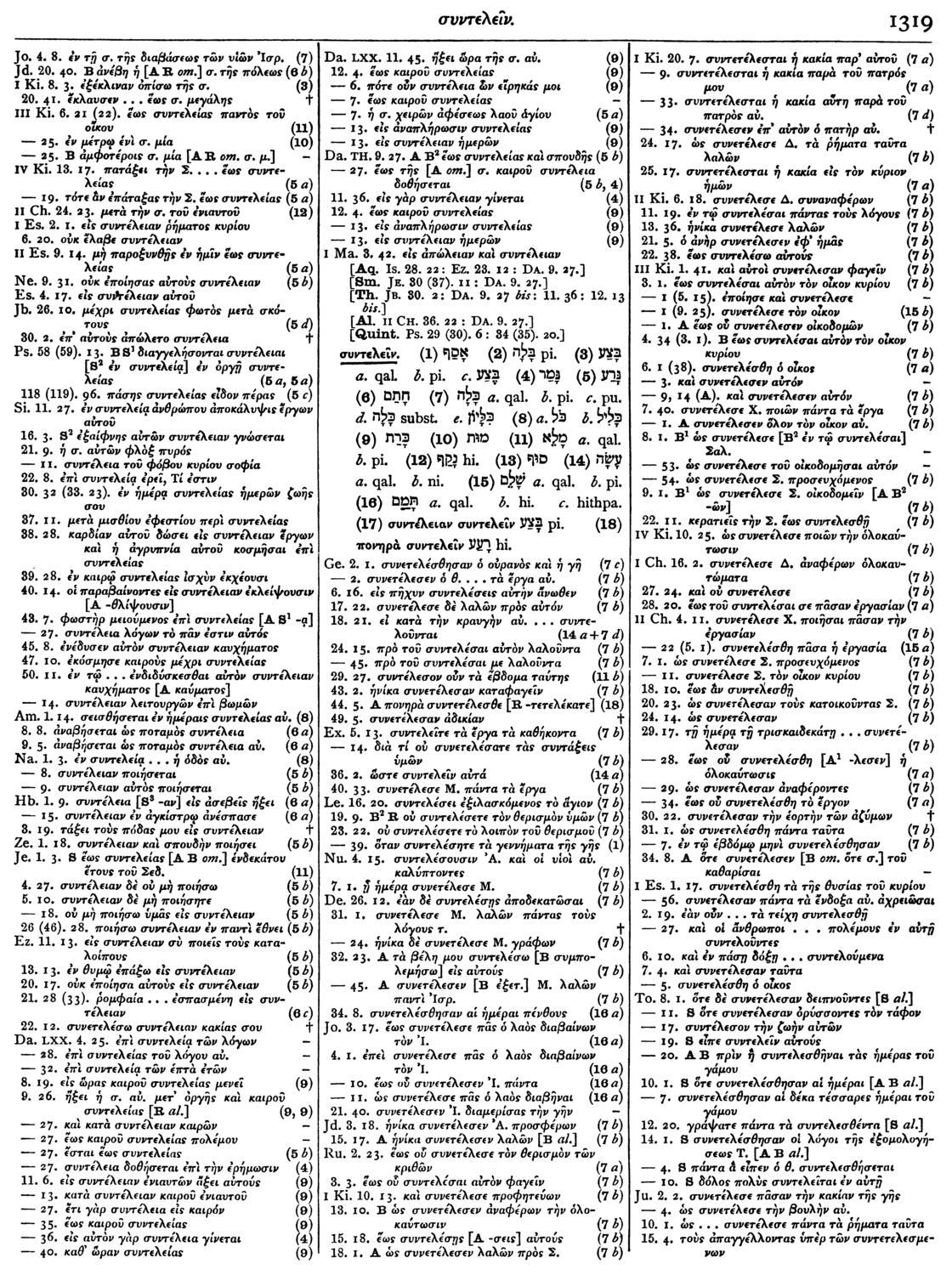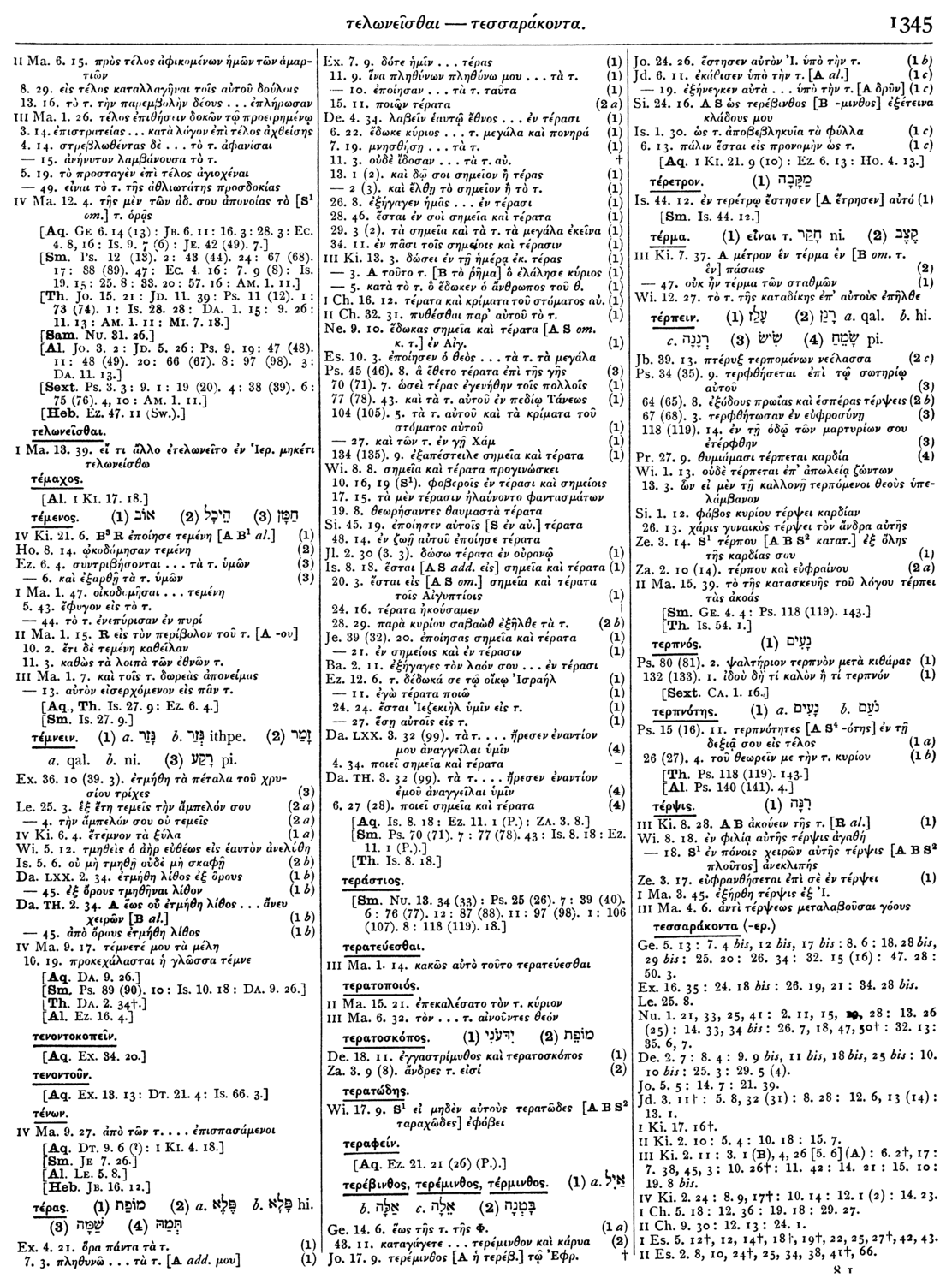Thank you for sharing the material. After finding all the verses which use the words synteleia and telos in LXX, I am comparing those passages with the parallel texts in Aquila’s Theodotion’s, and Symmachus’ versions to see whether some versions use one word instead of the other in LXX.
Some students of the Greek Scriptures say that the word synteleia means “conclusion” and implies a period of time and therefore cannot mean the same thing as the word telos (“end”). But I have seen a lot of passages in some Greek texts where the word synteleia is used in the same way as the word telos, as is seen, for example, by comparing the following verses:
2Ch 24:23.
NETS: “And it happened after the completion of the year, the Syrian force came up against him and came against Ioudas and against Ierousalem, and they destroyed all the rulers of the people among the people and sent all the plunder to the king of Damascus.”;
Rahlfs’ LXX: καὶ ἐγένετο μετὰ τὴν συντέλειαν τοῦ ἐνιαυτοῦ ἀνέβη ἐπ᾽ αὐτὸν δύναμις Συρίας καὶ ἦλθεν ἐπὶ Ιουδαν καὶ ἐπὶ Ιερουσαλημ καὶ κατέφθειραν πάντας τοὺς ἄρχοντας τοῦ λαοῦ ἐν τῷ λαῷ καὶ πάντα τὰ σκῦλα αὐτῶν ἀπέστειλαν τῷ βασιλεῖ Δαμασκοῦ.;
“after the end [synteleia] of the year.”
2Ki 8:3.
NETS: “And it happened after the end of the seven years that the woman returned from the land of the allophyles into the city, and she came to cry out to the king for her own house and for her own fields.”;
Rahlfs’ LXX: καὶ ἐγένετο μετὰ τὸ τέλος τῶν ἑπτὰ ἐτῶν καὶ ἐπέστρεψεν ἡ γυνὴ ἐκ γῆς ἀλλοφύλων εἰς τὴν πόλιν καὶ ἦλθεν βοῆσαι πρὸς τὸν βασιλέα περὶ τοῦ οἴκου ἑαυτῆς καὶ περὶ τῶν ἀγρῶν ἑαυτῆς.;
“after the end [telos] of the seven years.”
Da 11:6.
NETS LXX: “And at the completion of the years he will lead them, and the king of Egypt will enter the northern kingdom to ratify an agreement. And he will never prevail, because his arm will not establish strength. And the arm of him and of those associating with him will grow numb, and he will continue for a season.”;
Rahlfs’ LXX: “καὶ εἰς συντέλειαν ἐνιαυτῶν ἄξει αὐτούς, καὶ εἰσελεύσεται βασιλεὺς Αἰγύπτου εἰς τὴν βασιλείαν τὴν βορρᾶ ποιήσασθαι συνθήκας· καὶ οὐ μὴ κατισχύσῃ, ὅτι ὁ βραχίων αὐτοῦ οὐ στήσει ἰσχύν, καὶ ὁ βραχίων αὐτοῦ ναρκήσει καὶ τῶν συμπορευομένων μετ᾽ αὐτοῦ, καὶ μενεῖ εἰς ὥρας.”;
“at the end [synteleia] of years.”
Da 11:13.
NETS TH: “And the king of the north will return and will lead a crowd, larger than the former, and at the finish of the times of years he will attack the entrance with a great army and many supplies.”;
Rahlfs’ TH: “καὶ ἐπιστρέψει βασιλεὺς τοῦ βορρᾶ καὶ ἄξει ὄχλον πολὺν ὑπὲρ τὸν πρότερον καὶ εἰς τὸ τέλος τῶν καιρῶν ἐνιαυτῶν ἐπελεύσεται εἰσόδια ἐν δυνάμει μεγάλῃ καὶ ἐν ὑπάρξει πολλῇ.”;
“at the end [telos] of the times of years.”
Eze 20:17.
NETS: “And my eye spared them from wiping them out, and I did not make an end of them in the wilderness.”
Rahlfs’ LXX: καὶ ἐφείσατο ὁ ὀφθαλμός μου ἐπ᾽ αὐτοὺς τοῦ ἐξαλεῖψαι αὐτοὺς καὶ οὐκ ἐποίησα αὐτοὺς εἰς συντέλειαν ἐν τῇ ἐρήμῳ.;
“I did not make an end [synteleia] of them in the wilderness.”
Ec 7:2.
NETS: “It is better to go to a house of mourning than that to go to a house of drinking, because this is the end of everyone, and the living will give it to his heart.”;
Rahlfs’ LXX: ἀγαθὸν πορευθῆναι εἰς οἶκον πένθους ἢ ὅτι πορευθῆναι εἰς οἶκον πότου, καθότι τοῦτο τέλος παντὸς τοῦ ἀνθρώπου, καὶ ὁ ζῶν δώσει εἰς καρδίαν αὐτοῦ.;
“because this is the end [telos] of everyone.”
Greek lexicons usually mention “end” as the primary meaning of the word synteleia without reference to any period of time.
According to your understanding of the Greek language, what is the main difference between the words synteleia and telos?
Is “conclusion” (which involves a period of time) a secondary meaning of the word synteleia, “end” thus being the primary meaning?
Obtaining Various Greek Versions of the Hebrew Scriptures
Forum rules
Please quote the Greek text you are discussing directly in your post if it is reasonably short - do not ask people to look it up. This is not a beginner's forum, competence in Greek is assumed.
Please quote the Greek text you are discussing directly in your post if it is reasonably short - do not ask people to look it up. This is not a beginner's forum, competence in Greek is assumed.
-
Vlad Kotenko
- Posts: 14
- Joined: June 28th, 2016, 10:18 am
- Location: Volgograd, Russia
-
Ken M. Penner
- Posts: 885
- Joined: May 12th, 2011, 7:50 am
- Location: Antigonish, NS, Canada
- Contact:
Re: Obtaining Various Greek Versions of the Hebrew Scriptures
If that's what you're after, the Concordance by Hatch and Redpath provides what you need. At the end of a word's entry, you'll find [Aq.] [Sm.] [Th.] [Al.] [Sam.] [Quint.] [Sext.] [Heb.].Vlad Kotenko wrote: ↑April 11th, 2017, 11:53 am After finding all the verses which use the words synteleia and telos in LXX, I am comparing those passages with the parallel texts in Aquila’s Theodotion’s, and Symmachus’ versions to see whether some versions use one word instead of the other in LXX.


Ken M. Penner
Professor and Chair of Religious Studies, St. Francis Xavier University
Editor, Digital Biblical Studies
General Editor, Lexham English Septuagint
Co-Editor, Online Critical Pseudepigrapha pseudepigrapha.org
Professor and Chair of Religious Studies, St. Francis Xavier University
Editor, Digital Biblical Studies
General Editor, Lexham English Septuagint
Co-Editor, Online Critical Pseudepigrapha pseudepigrapha.org
-
Vlad Kotenko
- Posts: 14
- Joined: June 28th, 2016, 10:18 am
- Location: Volgograd, Russia
Re: Obtaining Various Greek Versions of the Hebrew Scriptures
Thank you for the material from the concordance for the Septuagint and the Hexapla. BibleWorks 10 with which I do lemma searches in the Septuagint does not contain the texts from the Hexapla, with the exception of Theodotion’s text of the book of Daniel. So the concordance of Hatch and Redpath can be useful in searching for Greek words in Aqula’s, Theodotion’s, and Symmachus’ texts.
-
Ken M. Penner
- Posts: 885
- Joined: May 12th, 2011, 7:50 am
- Location: Antigonish, NS, Canada
- Contact:
Re: Obtaining Various Greek Versions of the Hebrew Scriptures
I just heard from Brian Davidson that Peeters will soon start publishing the results of the Hexapla Project. John Meade's Job volume will be the first.Ken M. Penner wrote: ↑April 10th, 2017, 8:19 am [Also check out hexapla.org; I wish they would publish some of their results!
Ken M. Penner
Professor and Chair of Religious Studies, St. Francis Xavier University
Editor, Digital Biblical Studies
General Editor, Lexham English Septuagint
Co-Editor, Online Critical Pseudepigrapha pseudepigrapha.org
Professor and Chair of Religious Studies, St. Francis Xavier University
Editor, Digital Biblical Studies
General Editor, Lexham English Septuagint
Co-Editor, Online Critical Pseudepigrapha pseudepigrapha.org